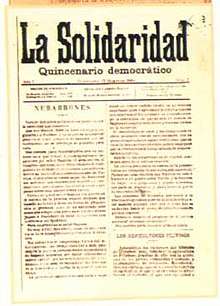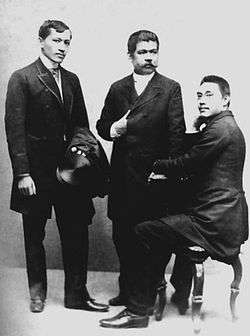La solidaridad
La Solidaridad (The Solidarity) was an organization created in Spain on December 13, 1888. Composed of Filipino liberals exiled in 1872 and students attending Europe's universities, the organization aimed to increase Spanish awareness of the needs of its colony, the Philippines, and to propagate a closer relationship between the Philippines and Spain.[1]
 | |
| Type | Biweekly newspaper |
|---|---|
| Format | Broadsheet |
| Editor | Graciano López Jaena Marcelo H. del Pilar Jose Rizal |
| Founded | 1889 |
| Political alignment | Independent |
| Language | Spanish |
| Ceased publication | 1895 |
Headed by José Rizal's cousin, Galicano Apacible, it also issued a newspaper of the same name which was published in Barcelona, Spain on February 15, 1889. It was edited by Graciano López Jaena and later on by Marcelo H. del Pilar.[2] The social, cultural, and economic conditions of the colonial Philippines were published in La Solidaridad. Speeches of the Spanish liberals about the Philippines were also featured in the newspaper.
Members
- Dr. José Rizal (Laong Laan and Dimasalang)
- Marcelo H. del Pilar (Plaridel)
- Graciano Lopez Jaena (Diego Laura)
- Antonio Luna (Taga-Ilog)
- Mariano Ponce (Tignalang, Kalipulako, Naning)
- Jose Maria Panganiban (Jomapa)
- Dominador Gomez (Ramiro Franco)

Other members
- Dr. Pedro Paterno
- Antonio Maria Regidor
- Isabelo delos Reyes
- Eduardo de Lete
- José Alejandrino
- Juan Luna
- Miguel Moran
- Felix Hidalgo
- Pedro Serrano
International members
- Professor Ferdinand Blumentritt (Austrian ethnologist)
- Dr. Miguel Morayta Sagrario (Spanish historian, university professor and statesman)
Note: Some friends of the Propaganda Movement also contributed.
History
La Solidaridad was established to express the goal of the Propaganda Movement towards achieving assimilation with Spain.[3] The first issue of La Solidaridad came out on February 15, 1889. A fortnightly and a bi-weekly newspaper, La Solidaridad serves as the principal organ of the Reform Movement in Spain.[2]
Comite de Propaganda in the Philippines funded the publication of the La Solidaridad. The editorship for the newspaper was first offered to Rizal. However, he refused because during that time he was annotating Antonio de Morga's Sucesos de las Islas Filipinas in London. After Rizal, Graciano López Jaena was offered for the editorship of La Solidaridad and he accepted.[2]
On April 25, 1889, La Solidaridad published the letter entitled "The aspirations of the Filipinos" which was written by the Asociación Hispano-Filipina de Madrid (English: Hispanic Filipino Association of Madrid).[3] It pursued desires for:[4]
- Representation in the Cortes
- Abolition of censure
- An expressed and definite prohibition of the existing practices of exiling residents by purely administrative order, and without a writ of execution from the courts of justice.
On December 15, 1889, Marcelo H. del Pilar replaced Graciano López Jaena as the editor of La Solidaridad.[2][3] Under his editorship, the aims of the newspaper expanded. His articles caught the attention of Spanish leaders and ministers.[3] Using propaganda, it pursued desires for:
- That the Philippines be a province of Spain
- Representation Filipino priests instead of Spanish friars — Augustinians, Dominicans, and Franciscans — in parishes and remote sitios
- Freedom of assembly and speech
- Equal rights before the law (for both Filipino and Spanish plaintiffs)
After years of publication from 1889 to 1895, funding of the La Solidaridad became scarce. Comite de Propaganda's contribution to the newspaper stopped and del Pilar funded the newspaper almost on his own. Penniless in Spain, del Pilar stopped the publication of La Solidaridad on November 15, 1895, with 7 volumes and 160 issues. In del Pilar's farewell editorial, he said :
We are persuaded that no sacrifices are too little to win the rights and the liberty of a nation that is oppressed by slavery.[5]
Notable contributors
Several writers contributed to La Solidaridad over its six years of existence, like Antonio Luna, Anastacio Carpio, Mariano Ponce, Antonio María Regidor, José María Panganiban, Isabelo de los Reyes, Eduardo de Lete, José Alejandrino, and Pedro Paterno. One of the most prolific contributors though was Rizal's confidant Ferdinand Blumentritt, whose impassioned defense of the Filipino interests was said to have been inspirational to the other writers and the readers of the newspaper alike.[3]
Notes
- "José Rizal and the Propaganda Movement". Retrieved 2011-11-04.
- "La Solidaridad and La Liga Filipina". Philippine-History.org. Retrieved 2011-11-04.
- Schumacher, John N. (1973). The Propaganda Movement, 1880-1895: the creation of a Filipino consciousness (1997 ed.). Manila: Ateneo de Manila University Press. p. 333. ISBN 978-971-550-209-2.
- Hispanic Filipino Association of Madrid (April 25, 1889). "The aspirations of the Filipinos". Barcelona, Spain: La Solidaridad. Archived from the original on July 13, 2010. Retrieved July 19, 2010.
- http://www.knightsofrizal.be/la_solidaridad/default.html
References
- Constantino, Renato. A Past Revisited. Quezon City: Tala Publications, 1975.
- Zaide, Sonia M. and Gregorio F. Zaide. The Philippines: A Unique Nation. Manila: All-Nations Publishing, 1999.
- Zaide, Gregorio F. Philippine History and Government. National Bookstore Printing Press, 1984.
